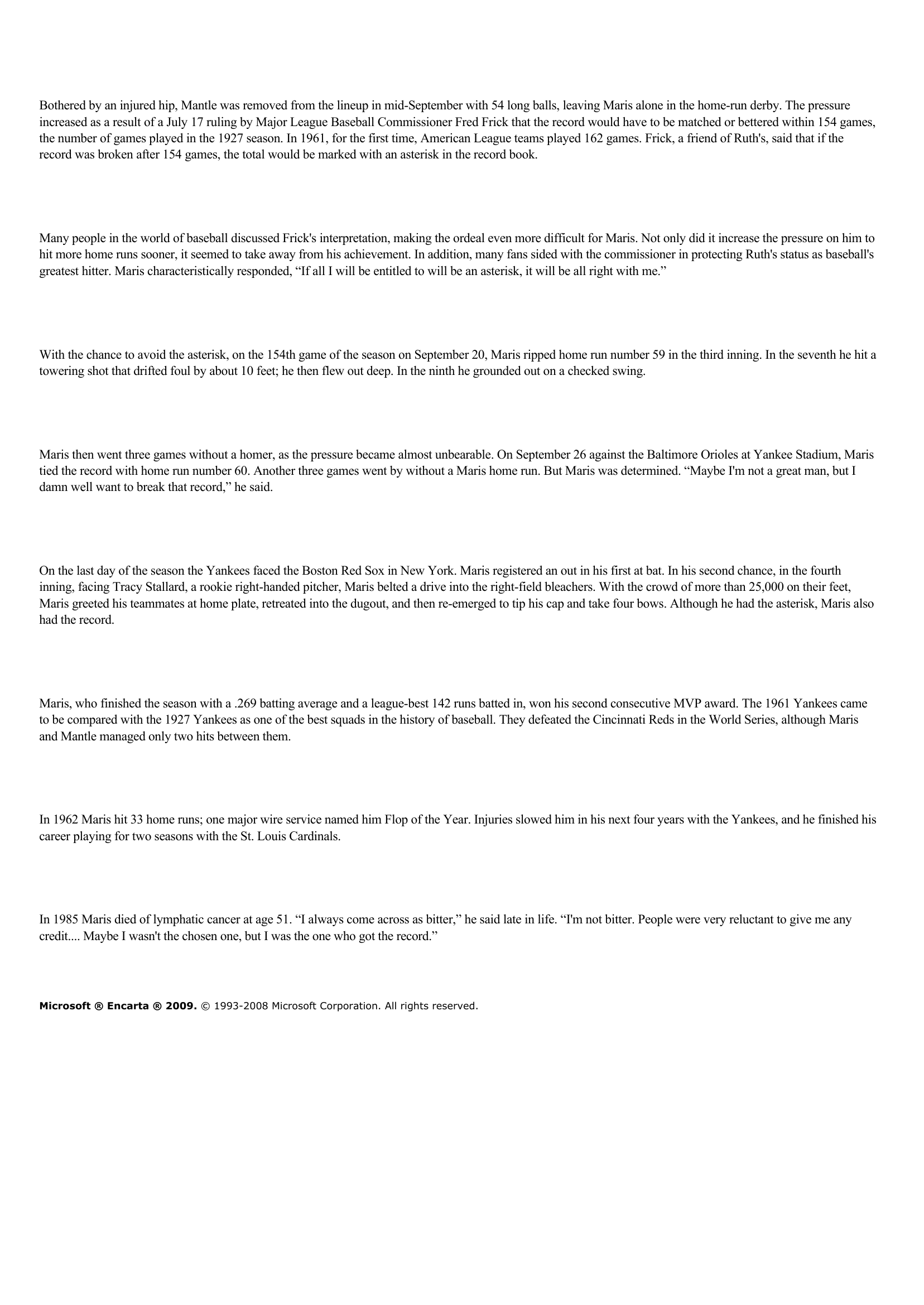Maris Breaks Home Run Record.
Publié le 14/05/2013

Extrait du document
«
Bothered by an injured hip, Mantle was removed from the lineup in mid-September with 54 long balls, leaving Maris alone in the home-run derby.
The pressureincreased as a result of a July 17 ruling by Major League Baseball Commissioner Fred Frick that the record would have to be matched or bettered within 154 games,the number of games played in the 1927 season.
In 1961, for the first time, American League teams played 162 games.
Frick, a friend of Ruth's, said that if therecord was broken after 154 games, the total would be marked with an asterisk in the record book.
Many people in the world of baseball discussed Frick's interpretation, making the ordeal even more difficult for Maris.
Not only did it increase the pressure on him tohit more home runs sooner, it seemed to take away from his achievement.
In addition, many fans sided with the commissioner in protecting Ruth's status as baseball'sgreatest hitter.
Maris characteristically responded, “If all I will be entitled to will be an asterisk, it will be all right with me.”
With the chance to avoid the asterisk, on the 154th game of the season on September 20, Maris ripped home run number 59 in the third inning.
In the seventh he hit atowering shot that drifted foul by about 10 feet; he then flew out deep.
In the ninth he grounded out on a checked swing.
Maris then went three games without a homer, as the pressure became almost unbearable.
On September 26 against the Baltimore Orioles at Yankee Stadium, Maristied the record with home run number 60.
Another three games went by without a Maris home run.
But Maris was determined.
“Maybe I'm not a great man, but Idamn well want to break that record,” he said.
On the last day of the season the Yankees faced the Boston Red Sox in New York.
Maris registered an out in his first at bat.
In his second chance, in the fourthinning, facing Tracy Stallard, a rookie right-handed pitcher, Maris belted a drive into the right-field bleachers.
With the crowd of more than 25,000 on their feet,Maris greeted his teammates at home plate, retreated into the dugout, and then re-emerged to tip his cap and take four bows.
Although he had the asterisk, Maris alsohad the record.
Maris, who finished the season with a .269 batting average and a league-best 142 runs batted in, won his second consecutive MVP award.
The 1961 Yankees cameto be compared with the 1927 Yankees as one of the best squads in the history of baseball.
They defeated the Cincinnati Reds in the World Series, although Marisand Mantle managed only two hits between them.
In 1962 Maris hit 33 home runs; one major wire service named him Flop of the Year.
Injuries slowed him in his next four years with the Yankees, and he finished hiscareer playing for two seasons with the St.
Louis Cardinals.
In 1985 Maris died of lymphatic cancer at age 51.
“I always come across as bitter,” he said late in life.
“I'm not bitter.
People were very reluctant to give me anycredit....
Maybe I wasn't the chosen one, but I was the one who got the record.”
Microsoft ® Encarta ® 2009. © 1993-2008 Microsoft Corporation.
All rights reserved..
»
↓↓↓ APERÇU DU DOCUMENT ↓↓↓
Liens utiles
- Ripken Breaks Record.
- Babe Ruth's 60th Home Run.
- Mazeroski's Home Run Wins the Series.
- An Injured Home Run.
- Hank Aaron Hank Aaron, born in 1934, American baseball player, nicknamed Hammerin' Hank, whose 755 home runs broke the all-time record previously held by Babe Ruth.












